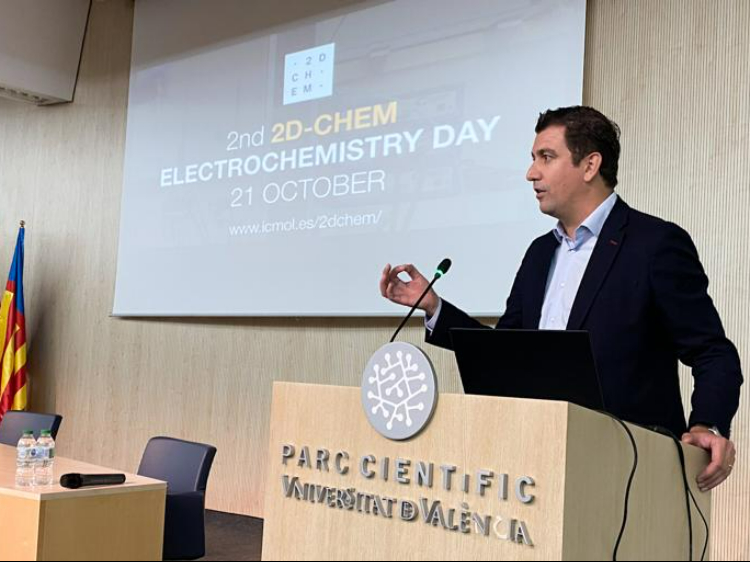
Throughout the day, in morning and afternoon sessions, researchers from centres in Spain, Sweden and Germany exchanged views on the reality and potential of electrochemistry at a "key" moment on a global level.
In fact, in his welcome speech, Gonzalo Abellán, distinguished researcher at ICMol and leader of 2DChem, pointed out that the world "is immersed in an industrial revolution that has energy at the centre of the debate and, therefore, all of us who work directly or indirectly in it are in some way involved".
In Abellán's opinion, "whether from the perspective of batteries, green hydrogen, from research in laboratories or from industry or business" we must "try to provide society with solutions to face the challenge of the energy crisis".
The war in Ukraine, he continued, is also reinforcing the need for new alternative sources, "a challenge that has been posed to Europe and that must be resolved" in the short and medium term. "I think we would all agree that if there is one branch of science that should be involved in this extremely important challenge, that's Chemistry".
Gonzalo Abellán coordinated the work programme, which was opened by José Manuel Serra, the new director of the Institute of Chemical Technology (ITQ), a joint centre of the CSIC and the Universitat Politècnica de València (UPV).
Other members of the ITQ who participated in the Electrochemistry Day were the postdoctoral researcher Laura Almar and the Senior Scientist Pasqual Oña. Speakers from the Institute of Molecular Science were Víctor Oestreicher; Álvaro Seijas and Camilo Jaramillo.
Francisco Fabregat, from the Institute of Advanced Materials of the Jaume I University (UJI), spoke about the production of hydrogen and the valorisation of by-products. And Víctor Sans, Distinguished Researcher of the GenT plan, also from INAM, showed the latest advances made at the UJI on electrochemical reactors.
Other invited speakers were Vicent Lloret, from the Helmholtz Institute Erlangen-Nuremberg (Hi ERN) and Rebeca Marcilla from IMDEA-Energía, one of the leading national experts in the development of storage systems using ionic liquids and organic batteries. In addition, Julio Lado, also from IMDEA-Energía, spoke on the transition between storage and environmental applications, one of the most important challenges at present.
The excellent panel of lecturers was completed by Toribio Fernández Otero, professor at the Universidad Politécnica de Cartagena and founder of CIDETEC, a private foundation for the transfer of electrochemical technology in the Basque Country; and Jaime Sánchez, from the Swedish technology company Smoltek, focused on the research and applications of carbon nanotechnology and listed on the Spotlight Stock Market in Stockholm.
For a whole day there was an opportunity to discuss electro- and photocatalysis for the production of green hydrogen. Also, organic, lithium, rechargeable alkaline and supercapacitor batteries, including fundamental aspects of electrochemistry such as artificial muscles or new electrochemical processes.
The conference was also attended by representatives of the companies Power Electronics, Zeleros and Graphenano.

